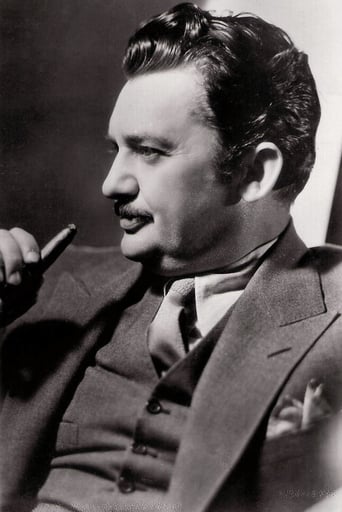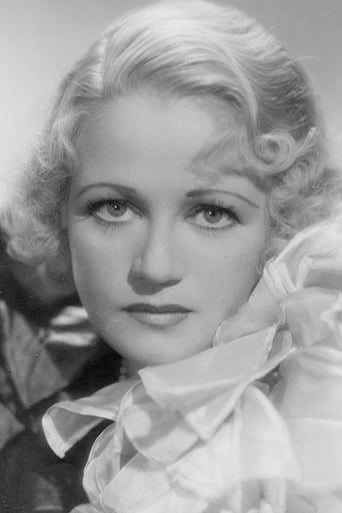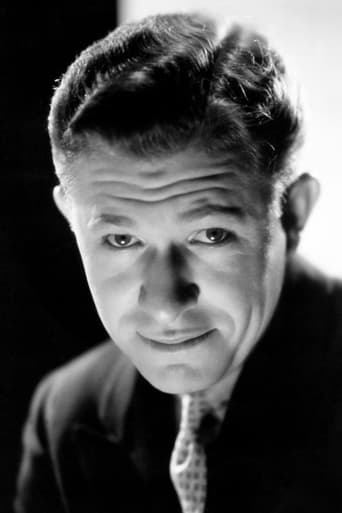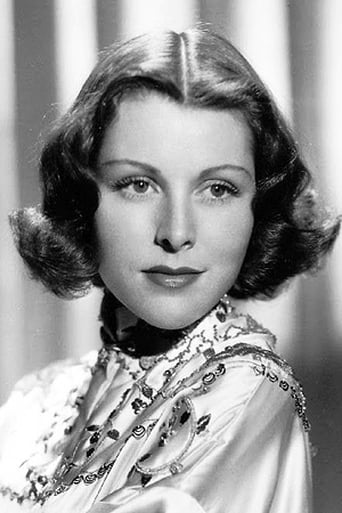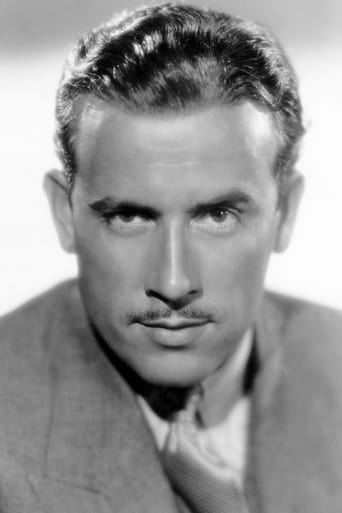BoardChiri
Bad Acting and worse Bad Screenplay
Senteur
As somebody who had not heard any of this before, it became a curious phenomenon to sit and watch a film and slowly have the realities begin to click into place.
Humaira Grant
It’s not bad or unwatchable but despite the amplitude of the spectacle, the end result is underwhelming.
Bumpy Chip
It’s not bad or unwatchable but despite the amplitude of the spectacle, the end result is underwhelming.
tedg
A mystery the way they used to make them, full of clues, an on screen detective and the expectation that the audience is working hard to make sense of everything. Near the end, they stop the film and an announcer appears to give the audience a minute to guess.The murderer is hard to guess, and this also has some interesting genre features. One is that the main suspect turns himself in before the crime. What mars this is that we have that one anti-cinematic device: the lights go out and events happen without us being able to see them. All crimes happen on-screen, but the crime itself is occluded. This happens twice, each time there is a murder.As a narrative device, we have evolved away from this one, and I guess I am sad to see it go, because with it, you have purity: everything essential happens in front of you. But evolved away we have, to be replaced by off screen unknowns.We have also lost the character who is our on-screen detective, but not as a result of cinematic development. These guys just faded from life in general, the newspaper crime reporter. That is a loss too.
calvinnme
Dr. Emil Brandt (Jean Hersholt) staggers into a police station and confesses to murder ... only problem is he hasn't committed it yet. However, he has figured out all of the details and confesses what he intends to do to the police. He is a hypnotist and psychologist and his work involves turning people away from criminal activity. One of his current patients is a bank president who is feeling the urge to steal - Philip Ames. Brandt has already given him a command while under hypnosis - to bring him one hundred thousand dollars - a little over a million dollars in today's money. Tonight, when Ames returns to Brandt's house, it was Brandt's plan to put him under as he usually does with hypnosis, then take the money, kill Ames with a single wound to the heart, then dissect his body and dispose of it. The police would be searching for Ames when the money was discovered missing, but they'd be looking for a live thief not a dead victim of hypnotic suggestion.Brandt confesses all of this because he is a moral man, is horrified by his own thoughts, and wants to be stopped before it is too late. How did things get this far? Because the moral Brandt is married to a very immoral woman, and she's been suggesting that she will leave Brandt unless their financial situation improves. The police say they can't arrest him for what he hasn't done but they will come to his house and make sure he doesn't carry out his plan. Brandt is thankful and relieved.In spite of all of these precautions, Brandt does wind up - seemingly alone - in a room with his wife and a hypnotized Ames. The lights go out. Brandt's treacherous wife screams, hears a scuffle, then wrestles with someone in the dark, then flees into the street looking for help. The person who comes to her aid is crime beat reporter Dan McKee (Stuart Erwin). When the lights come back on Ames is dead in the manner described by Brandt in his plot, the money is gone, and Brandt lies next to Ames unconscious from chloroform.McKee wants to bust this crime wide open for his paper, but he has to work around the police and deal with the fact that there are so many suspects - Brandt's daughter, Brandt's wife and her lover for obvious reasons, Brandt himself, the police who knew Brandt's plans, maybe even Brandt's servants - had they been snooping on private conversations?. Then there is some mystery man who shadows Brandt from the beginning of the film up to the time of the murder. Could he have done it? Brandt's daughter seems innocent enough, but she could have gotten into the house any time, plus McKee is sweet on her. Could she be the killer? What is unique and rather William Castle-like about this film is that about 15 minutes before the end the film is stopped and an announcer comes out and says that this film is moving so fast that the viewer doesn't have time to figure out who did it, so a brief intermission is declared as all of the suspects are shown on the screen while the intermission clock counts down. Then the film concludes.I really liked this one. Although you are led to believe Jean Hersholt is going to be the lead in the beginning, it is actually Stu Erwin's picture most of the way, and he rises above his normal corn-fed supporting man image and comes across true as the hard-working crime beat reporter confident he can get the killer, get the story, and get the girl, even though it might be the girl herself or her father that he winds up sending to the electric chair.
kidboots
This movie is filled with some top stars - including Jean Hersholt, one of the screen's greatest character actors. From his humble Hollywood beginnings as a rowdy townsman in "Hell's Hinges" (1916) to the twenties with two of his greatest characterizations - as the evil Marcus in "Greed" and the tasteless Ed Munn in "Stella Dallas" - he never disappointed. In the 30s I can remember him as Mr. Schmidt, the downtrodden father in "Unashamed" and as Sorenson, the kindly businessman, who really loves Anita Page in "Skyscraper Souls". "The Crime of the Century" gave him a rare lead.Reminiscent of the classic "D.O.A", Dr. Emil Brandt (Jean Hersholt) walks to the police station to report on a murder that hasn't happened yet - but will if he is not locked up!!! He has a young wife, Frieda (Wynne Gibson) and he will do anything in his power to keep her happy. He has hypnotized a bank clerk and has ordered him to take $100,000 from the bank's vault and deliver it to him at 8.15 that night. Emil takes the policeman home with him, hoping he will stop him from the final act of murder. The hypnotized bank clerk comes to the house and even though the policeman wants to arrest the clerk, Emil convinces him to allow the man to return the money to the bank. Of course, when the police leave, a murder is committed. Dan McKee (Stuart Erwin) a likable reporter comes into the picture and teaming up with Doris (Frances Dee), Emile's beautiful daughter, tries to solve it. There are plenty of suspects including Gilbert Reid, Frieda's lover and William Janney as a mysterious stranger. When Frieda is killed, a narrator is introduced to go over the case thoroughly with the viewers. It is a similar ploy to "The Phantom of Crestwood" (1932), which originally had been a radio serial, that, as a novelty, got listeners to write in with their own ideas of how it should end - and the winning listener got to see their ending at the movies!!! "The Crime of the Century" wasn't that imaginative - after the narrator showed all the clues and the suspects, the film commenced as before!!Wynne Gibson, as usual, gave a stellar performance. Who can ever forget her - if only she had made more movies!! No matter how small her role - she was usually the character you remembered. "Ladies of the Big House" - she wasn't the star but you couldn't forget her Susie who makes life tough for Sylvia Sidney. "If I Had a Million" - her segment was probably the best, as the wornout prostitute, who uses some of her money to book into the best hotel in town for an uninterrupted night's sleep. Could Frances Dee have been too beautiful? - she was always very easy on the eye and also proved she could act in movies like "The Night of June 13th" and "The Silver Cord".Highly Recommended.
dbborroughs
Crime of the Century "Alienist" (thats the term they use) arrives at the police station asking to be locked up. It seems that as well as being able to get people and criminals to confess he thinks he's come up with a way to get people to do evil things. He's come up with the idea of getting some one to commit a robbery and then kill them to cover the crime. Afraid he'd do it he's gone to get himself locked up. The police think he's mad and the police Captain takes him home. From there the tale spins out in a story of murder and robbery. Despite the lofty title the film is neither the film of the century and the crimes in it don't make up the crime either. An okay mystery the film bogs down with some performances that just seemed flat. Jean Hersholt (You know him best for the ward given at the Oscars every year) is good as the frantic alienist, as is the woman playing his daughter, however the police and the reporter seem to to really care. How can I get excited about mystery when the people charged with solving it are so low key, I mean their well written dialog which is full of snappy one liners just sort of lays there.It's an okay film, I just wish it was better
